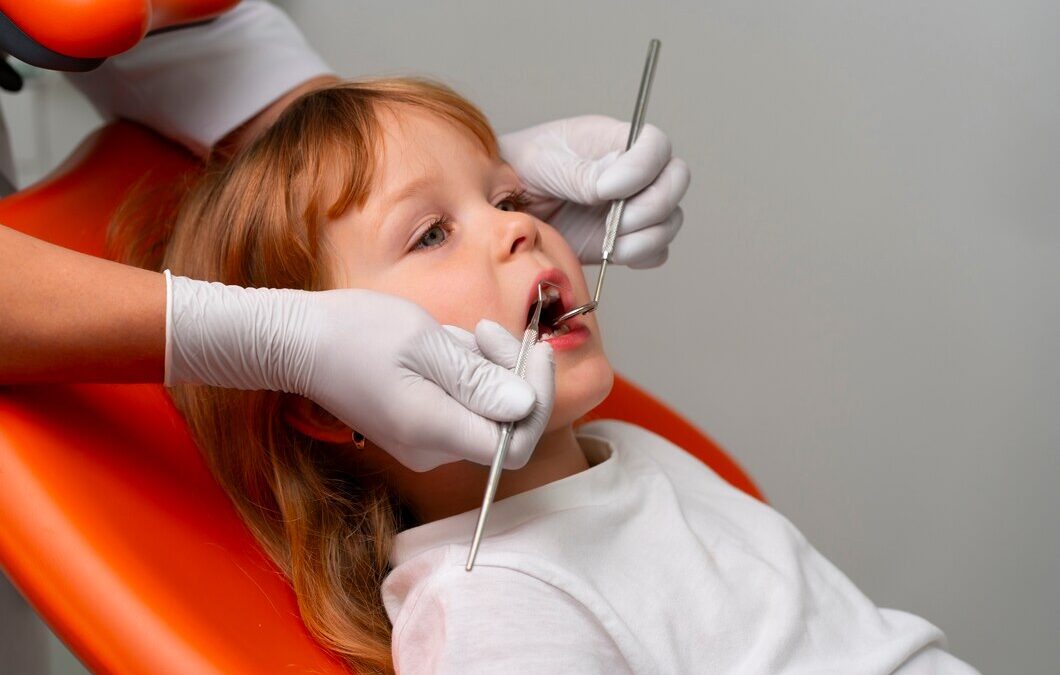Keeping kids’ smiles healthy is a top priority for parents everywhere. Children face several dental challenges as they grow, with issues like cavities and tooth decay being especially common. These problems can cause discomfort and lead to more serious dental issues if not addressed early.
Understanding what causes these dental problems is key to prevention. Let’s explore these strategies in detail to ensure your children maintain strong, healthy teeth.
Understanding Common Dental Problems in Kids
Children often face various dental problems as they grow, with cavities and tooth decay being at the top of the list. Cavities, caused by bacteria-producing acids that destroy tooth enamel, are especially common due to the high sugar content in many children’s diets. These acids can lead to painful holes in the teeth known as cavities and potentially severe decay if not treated promptly. Tooth decay can affect baby teeth and permanent teeth, making early care essential.
Gum disease is another significant issue, marked by red, swollen gums that may bleed during brushing or flossing. It’s generally caused by poor oral hygiene, leading to the buildup of plaque—a sticky film of bacteria. If untreated, gum disease can result in more severe problems, including tooth loss.
Misaligned teeth or bite issues pose additional challenges. Crooked or crowded teeth can lead to discomfort and difficulty cleaning, increasing the risk of cavities and gum disease. Additionally, misalignment can affect a child’s self-esteem and overall oral function.
Addressing these problems early on is important. Proper dental care and early intervention not only help prevent these issues but also ensure that children’s dental health is maintained as they grow.
Causes of Dental Problems in Children
Several factors contribute to dental issues in kids, with poor oral hygiene and sugary diets being primary culprits. Children often skip brushing or do not brush effectively, allowing plaque to build up and cause cavities or gum problems. A diet high in sugary snacks and drinks fuels bacteria that produce acid, a significant cause of tooth decay.
Other causes stem from genetics and habits that develop in early childhood. For instance, some children inherit traits that make them more prone to dental issues, such as enamel weakness or crowded teeth. These inherited issues can lead to easier buildup of plaque and a higher risk of decay.
Habits like thumb-sucking and prolonged use of pacifiers also play a role. These actions can affect the alignment of teeth or lead to changes in the roof of the mouth, resulting in bite problems. These habits should be addressed in a timely manner to prevent long-term effects on dental development.
Additionally, a lack of regular dental visits means problems may go unchecked. Early detection and treatment are key to managing and preventing dental health issues. By understanding these causes, parents can take preventive measures to ensure their children’s smiles remain bright and healthy.
Effective Prevention Strategies for Parents
Parents can play a significant role in preventing dental problems by establishing consistent oral hygiene habits at home. Encourage kids to brush their teeth at least twice a day using fluoride toothpaste. Proper brushing techniques, such as covering all tooth surfaces and brushing for at least two minutes, are crucial. Parents should also supervise young children to ensure they brush effectively.
Flossing daily helps remove plaque and food particles between teeth, places that toothbrushes can’t always reach. Teaching kids to floss early on makes it easier for them to incorporate this into their routine as they grow.
Diet plays an equally important role in dental health. Offer children a balanced diet rich in fruits, vegetables, and whole grains while limiting sugary snacks and drinks. Encourage water as the primary drink, as it helps wash away food particles and keeps saliva levels high, which naturally protect teeth.
Creating a fun and engaging routine around dental hygiene helps in building lifelong habits. Use songs, rewards, or colorful charts to make brushing and flossing more enjoyable for kids. Consistency and involvement make a big difference in maintaining their oral health.
Importance of Regular Dental Checkups
Routine dental checkups are vital for maintaining good oral health in children. Visiting the dentist regularly helps in early detection of potential issues like cavities, gum disease, and misalignment. Early treatment can prevent these problems from becoming more serious, saving time and discomfort in the future.
Dentists provide professional cleanings that remove tartar buildup, which regular brushing and flossing might miss. They also offer valuable guidance tailored to your child’s oral health needs, including tips for improving hygiene practices and dietary advice.
Checkups also allow for monitoring the development of permanent teeth and the overall health of the mouth. Dentists can provide interventions such as sealants or fluoride treatments to protect teeth and strengthen enamel.
By making regular visits part of your child’s health routine, you can ensure that their oral health remains a priority. Dental visits foster a positive relationship with oral care, reducing fear or anxiety associated with dental offices.
Conclusion
Proper dental care for children requires a combination of good habits, attention to diet, and regular professional checkups. These elements work together to prevent frequent dental issues like cavities and gum disease, ensuring a healthier future with fewer oral health challenges. Encouraging healthy routines and making dental care fun positively affects kids’ willingness to maintain good dental hygiene.
At New Life Dental Arts, we are dedicated to supporting families in maintaining exceptional dental health. Schedule an appointment with us to ensure your child’s dental care is top-notch. Our friendly staff and dentist in Lake Stevens, WA, is here to guide you and make dental visits a positive experience for your child!

